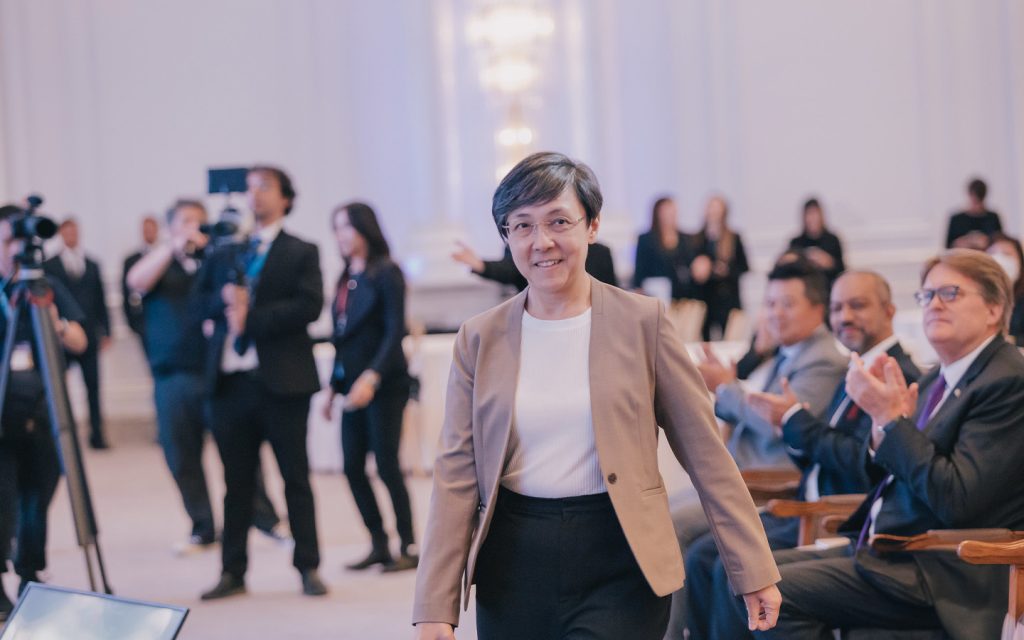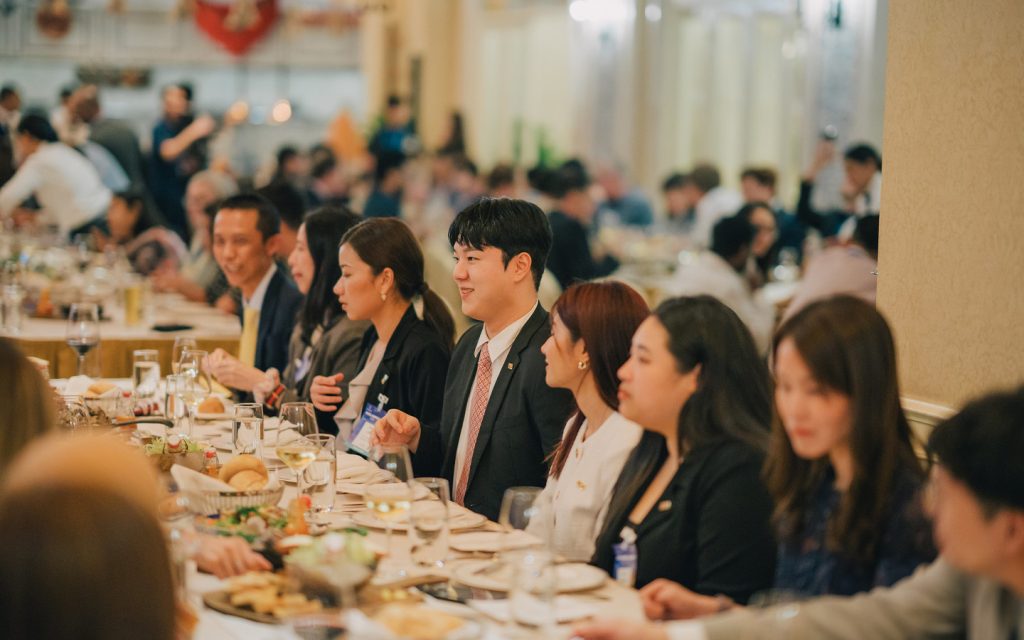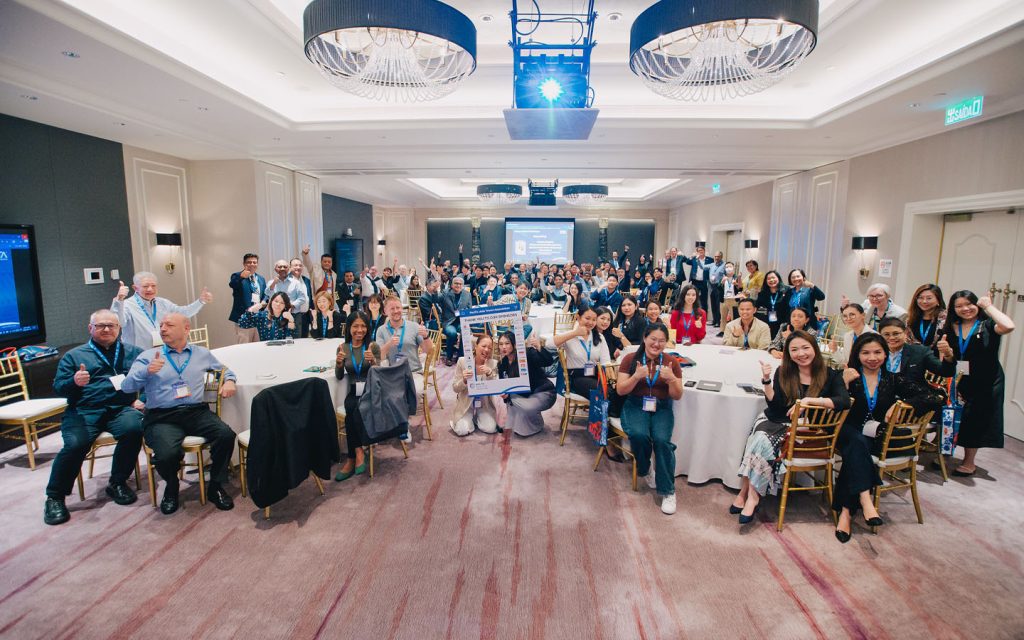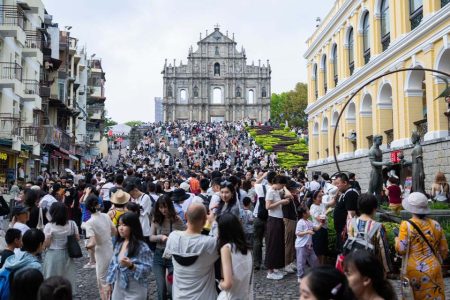Industry trends were high on the agenda on day two of the 2024 Pacific Area Travel Association (PATA) Annual Summit today.
The event, which was held at the Grand Lisboa Palace in Cotai, began this morning with a conversation between the chair of Shun Tak Holdings, Pansy Ho, and the chair of PATA, Peter Semone.
Over the course of a wide-ranging discussion, Ho spoke about her career, identity (“you never give up your own identity, you continue to want to be Chinese”) and the role of culture in tourism.
[See more: China grants visa-free travel to six more European countries]
“In Macao, we have always combined developing our cultural programmes alongside promoting tourism,” she told Semone. “Our heritage is part of our everyday life.”
Ho also spoke of what the future held. Macao, she said, is “now the largest gaming, integrated resort destination in the world, we also have honed our skills in honing this cross-sector development. From MICE and entertainment to arts and culture and wellness, we want to bring everyone together not only to help Macao grow, but also [become] a gateway to China. This is the strategic repositioning.”
The future of travel and tourism

The morning continued with a presentation entitled “Key Travel and Tourism Trends to Watch” by Caroline Bremner, senior head of travel research at Euromonitor International. She shared data showing that Asia-Pacific travellers valued customised experiences – “that human, personal touch is absolutely vital,” Bremner said – but are also not afraid to embrace technology, “Asian consumers are using tech more than other regions to make travel more seamless,” she explained. AI, while seen as “hugely disruptive” was also just “another tool in the toolbox.”
The environment, unsurprisingly, featured prominently in Bremner’s presentation. “Sustainability is, by default, the most important issue we face going into the next couple of decades,” she said.
While Bremner noted that “You really do not see the flight-shaming trend here like you do in Europe,” she found that Asia-Pacific consumers were “buying from purpose-driven brands that put people, planet and profits on a par.” She added that more than 30 percent of consumers were buying from brands aligned with their social beliefs.
“People are very much voting with their conscience, attitude and values,” Bremnner said.
[See more: MGTO head speaks at a UN conference on women and sustainable tourism]
Similar themes were echoed in the panel discussion that followed, entitled “Where Are We Heading?”
“More travellers are paying attention to green development, and they want to pay for it. They will pay a little higher for green tourism,” said Liu Shijin, the vice chairman of the World Tourism Alliance.
Other speakers related AI to sustainability. “Hilton Hotels are using AI to reduce their [food] waste,” said Sarah Wang, regional director of the World Travel & Tourism Council. “There we see the good force that AI can [provide] our sector.
She also pointed out that Microsoft had partnered with American Airlines to help reduce taxi times when planes have landed, helping pilots find the nearest gate, saving on fuel and increasing efficiency. “It looks simple but involves a lot of data points,” Wang pointed out, adding that Microsoft believed it could “save nearly 10 hours of taxi time per day” fleet-wide.

Other speakers during the morning session addressed future trends in hotels, aviation and travel technology.
AI and human capital
The conference continued in the afternoon with discussions on the role of travel agents in the age of AI and human resource challenges faced by the industry.
Speakers echoed earlier themes about the “human touch” being important, even as savvy travellers lean in to the latest technology. “It’s important to remember that it doesn’t matter how much technology is in this business, it’s still a people business,” said Boris Miketic, the president of Croatia Travel. “Lots of people – young people – want to embrace the new technology, but not everybody. Lots of people are very sceptical.”
Henry Oh, the chairman of the Korea Association of Travel Agents, said the technology still had to make inroads in his country. “We have about 20,000 travel agents in Korea,” he told delegates, “but none are using AI. It’s good technology, but we don’t know how to use it.”
For Maria Paz Alberto, the chair of PATA’s Philippine Chapter and the president of Ark Travel Express, AI’s function for the time being was purely utilitarian. “We get an AI robot to reply to any inquiry after 11 pm, like the night shift. It helps us a lot. What we get in the night, we can reply to in the morning.” At the same time, she conceded that there was a lot of fear around AI, “but we will survive and we will thrive.”
[See more: Macao is on track to welcome two million foreign visitors this year, MGTO says]
In the following session, Hannah Pearson of the Adventure Travel Trade Association and the director of a tourism consultancy, underscored the people-centric nature of the travel industry. In a presentation on the challenges of developing a skilled tourism workforce, she said “There are a lot of challenges working in the tourism industry. So why do we do it? Passion and purpose. People want to meet new people and go travelling. It’s that connection.”
At the same time, she outlined the challenges facing the industry from an employee point of view, including comparatively low wages and a lack of training in sustainable tourism. “Passion is not enough,” Pearson said. “The industry needs support. It needs dialogue. What kind of tourism workforce do we want in five to 10 years’ time? What can we do to get everyone in the same room together to address the disconnects?”

In a subsequent panel discussion, Simon Lloyd defended the role of educators in preparing students for a career in travel. The dean of hospitality management and business administration at Bangkok’s Dusit Thani College said “From our side as an institution, I certainly believe we prepare our students very, very well. We have a 98 percent employment rate after graduation. They go on to work at five-star hotels across Bangkok. However, 75 percent of my students go into sales and marketing and 10 percent go into corporate office HR roles. The challenge is, where are the jobs in tourism?”
He also addressed the difficulties facing tourism educators. “Programmes are underfunded. Instructors are underpaid. I think educators have a very hard time developing passionate people to go out and work in the hospitality industry, and it’s not their fault.”
Looking to the future of tourism
The day wrapped up with a closing keynote by David Fowler, the Asia-Pacific vice president for Visa, who summed up some of the main conference themes and attempted to paint a vision of travel in the future “where operators and suppliers are integrated.”
He told delegates: “We’re imagining ourselves two years in the future, we’re at home on a Sunday night using social media, and see our favourite travel vlogger is in Hong Kong. You hit ‘book now’ and suddenly you’re in a hyper-integrated engine enabling seamless travel. With a blink or touch of the fingertip, you make a booking.”
[See more: Six apps you need for your next trip to Macao]
The vision of travel powered by tech was one shared by many at the PATA summit. Fowler stressed that the future was AI dependent. “The traveller journey has changed. Everyone has talked about that over the past two days. It has changed irrevocably. It’s not just the Michelin restaurants. It’s the HK$2 tram rides. It’s the bowl of noodles. The consumer experience is digital-first for the modern traveller. There’s no going backwards from this.”
He urged delegates: “Don’t run away from technology. Run towards it.”
The PATA Annual Summit concludes today. This is the second time the event has been held in Macao, with the first being in 2005.
Macao News is an official media partner of the 2024 PATA Annual Summit.
— With reporting by Craig Sauers






